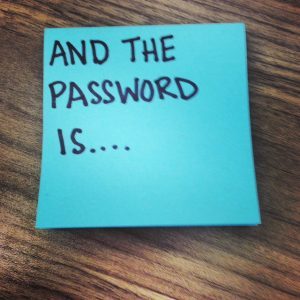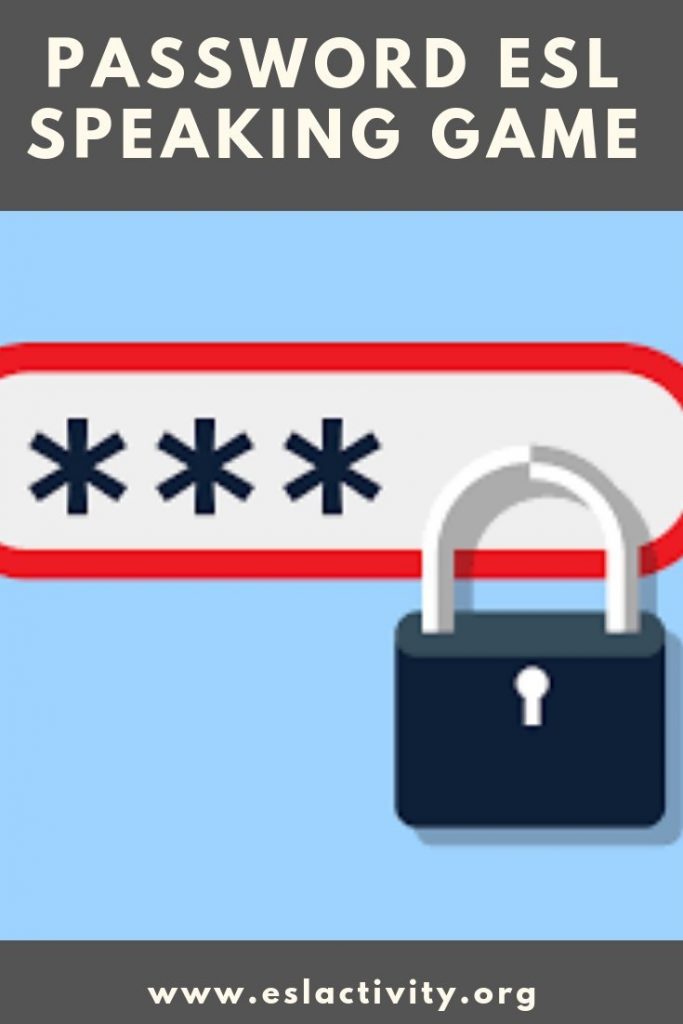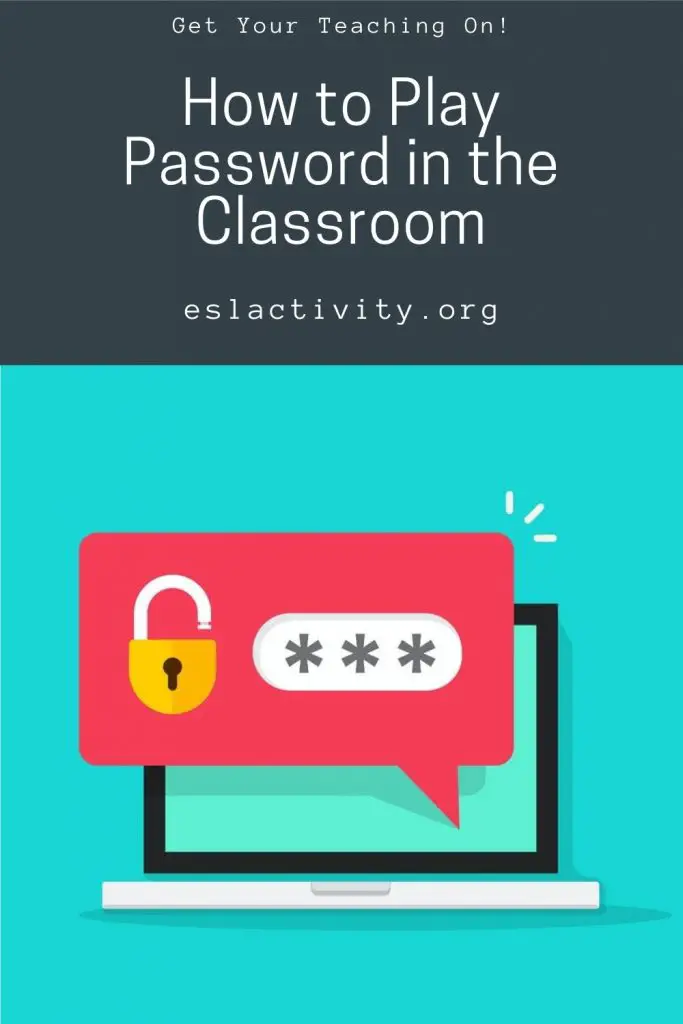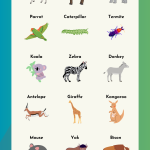How can I make my English classes for kids more fun? That’s a good question! Keep on reading to find out how you can create some excitement in your classes today with this game of password. Find out all the details you need to know about how to play password in the classroom.

The Password Game
It can sometimes be challenging to come up with fun, interesting ESL speaking games and activities for lower-level students. Password is one of my go-to activities for this group and it works particularly well with children or teenagers. I’ve also used this with beginner adults with good results.
It’s an excellent way to review English vocabulary. Remember, we can do A LOT to help our students remember new words by reviewing them in class periodically. Password is an excellent way to do this. You can take advantage of an English information gap of sorts.
Password can also be used as a short warm-up game to review material from the previous class, or a quick filler at the end of class. Read on to find out all the details you need to know about this password game for kids, including how to play password in the classroom.
Password Game: Introduction
Materials Required: List of vocabulary words, whiteboard
Level: Beginner to intermediate
Time: 5-10 minutes
Ages: 7-adult
The game of password is aspeaking activity that helps students review vocabulary and practice an important skill: describing something they don’t know the word for. It’s the perfect way to help keep some old words fresh in your students’ minds.
A simple example. Maybe you’re teaching vocabulary for the weather. The secret word is “snow.” Students can use other words they know like, “cold, white, not rain, ice rain, winter” in order to describe it. That’s a lot of vocabulary covered right there!
For more ideas related to this, please check out: ESL Weather Activities.
A good time to use this activity is at the end of a unit, or before a midterm or final exam. Create the game based on the topics that you’ve covered with your students. You could also consider using this activity for holiday-themed lessons. It’s a nice ESL Easter Activity for example.
- Amazon Kindle Edition
- Bolen, Jackie (Author)
- English (Publication Language)
- 92 Pages - 07/12/2015 (Publication Date)
Here’s how you play the Password Game with ESL Students:
Divide students into two groups. The groups will alternate sending a team member (captain) to the front of the class. Write a word over their head, so the teammates can see and read it, but the captain cannot. The team must give the captain hints (not using the word in question) until they guess the word or time runs out (10-20 seconds). The team with the most points wins.
Variation: Have one team’s turn last until they run out of time (2-3 minutes), then switch. This gives an advantage for correctly guessing more quickly. You can have the same captain for the entire time, or you can require them to switch for every word. I ask a student from the other team to use their phone and time the allotted time.
If you play with this variation, it’s helpful to give each team one pass per round. It’s sometimes the case that the captain just doesn’t know that new vocabulary word and no amounts of good hints is going to help them!
In either case, be sure to keep things moving along quickly so that it doesn’t get too boring.
Variation: You could also have some pictures prepared on the PowerPoint and then play the same way. For example, jobs, animals or school supplies, etc. Flash the picture up on the screen, and then the team has to give hints about it.
What about the Game Password for Bigger Classes?
Does this activity work for classes of more than 20 students? That’s a popular question that people have!
In general, you can use it for big classes, but it isn’t as useful as it could be. This is because the same 2-3 students from each team dominate the game, while the other students are mostly passive.
However, for a class of fewer than 12? It’s ideal. You’ll have two teams of 5-6 players. One person is at the front, and then only 4-5 students are describing the word.

Password Game for Kids
Does Password Work at the Sentence Level?
You can consider playing this at the sentence level, but it’s a bit more difficult to manage. The reason for this is that it’s difficult to judge whether or not the sentence is correct, or not.
I find that it works best with single vocabulary words.
You know those teaching situations when you set up a game or activity but regret it almost immediately? I had this feeling when doing Password with sentences!
Procedure for Password, a fun Speaking Games for Kids (or Adults!):
If you want to know how to play password in the classroom, then keep on reading for all the details you need to know.
- In advance, prepare a list of English words. These can be vocabulary or just words you expect your students to know.
- Divide the class into two groups.
- Have groups alternate sending a captain to the front of the classroom. Or, give each group a time limit of 2-3 minutes and rotate team members as soon as one guesses a word until the time is up.
- Write a word on the whiteboard over the captain’s head, so their team can see it, but they cannot.
- Their team must give the captain hints until they guess the word or time runs out (10-20 seconds). Or, until the round is up (keep adding new words once one is guessed).
- The team with the most points after each student has had a turn wins.
Try out this fun ESL speaking activity for a warm-up in one of your classes and I’m sure your students will enjoy it. For even more ideas, check out: ESL White Board Games.
Teaching Tips for the Password Game for Kids:
Make sure you get this activity off to a good start by setting some ground rules up first.
- The captain must not turn around, or the round is finished.
- Only English! If you hear a word of the native language, the round is finished for that team.
- No hand gestures
- The only team must stay silent and cannot try to distract the other team while it’s their turn.
- Order is important and there should be no running, yelling, etc.
Basically, you want to emphasize that students should try to get their captain to say the word only through giving hints in English. That is the only way to achieve the goal.
Do you Like the Game Password?
- Bolen, Jackie (Author)
- English (Publication Language)
- 112 Pages - 06/04/2015 (Publication Date) - CreateSpace Independent Publishing Platform (Publisher)
If you like this simple ESL activity that you can use to review vocabulary, then you’re going to love this book: 39 No-Prep/Low-Prep ESL Speaking Activities for Kids. There are almost 40 ESL games and activities that are focused on speaking for kids (7+).
ESL Conversation Games and Activities
It’s lesson planning made easy, guaranteed. Open the book, pick out an activity or two, adapt it slightly to the lesson you’re teaching and you’re good to go! Lesson plans: not so difficult with this book! Keep a copy on your bookshelf as a handy reference tool. Or, a copy on your phone for lesson planning at your favourite coffee shop.
Available in a Variety of Formats
You can get the book on Amazon in both digital and print formats. The (cheaper!) digital version can easily be read on any device by downloading the free Kindle reading app. Have 39 fun, and engaging activities for kids at your fingertips anywhere you go.
Help your students learn English while having fun! It really is that easy to make your English classes even better.
More ESL Games for Kids
If you’re looking for even more ideas for things to do in your English classes for kids, yo’ll want to try out some board games. They’re student-centred, fun, engaging and can be used for a wide variety of vocabulary or grammar points. Learn more about them in this short video below:
FAQs
There are a number of common questions that people have about this activity. Here are the answers to some of the most popular ones.
What is the objective of “Password”?
The objective of “Password” is for the players to guess the secret word or phrase correctly within a certain number of guesses or within a specific time limit.
Can you give an example of how “Password” is played?
Sure! Let’s say the secret word is “elephant.” The player giving the clue might say “animal,” and the other players would guess different animals until someone says “elephant.”
Is “Password” a good game for practicing vocabulary?
Yes, “Password” is an excellent game for vocabulary practice as it requires players to think of words related to a specific theme or category.
Can “Password” be adapted for different skill levels?
Absolutely! “Password” can be modified to suit different skill levels by adjusting the difficulty of the secret words or phrases and the complexity of the clues.
Are there any variations of the game “Password”?
Yes, there are variations of “Password” such as “Taboo” or “Catchphrase” that add additional rules or challenges to the game.
Can “Password” be played online?
Yes, “Password” can be played online using video conferencing platforms or online game platforms that provide a virtual environment for players to participate in the game.
Is “Password” a popular game in ESL classrooms?
Yes, “Password” is a widely used game in ESL classrooms due to its simplicity, versatility, and ability to engage students in active vocabulary practice.
Have your say about the Password Game for Kids!
What do you think about Password? Did you try it out with your students? Or, do you have a go-to game that you use to review new vocabulary in your ESL classroom? Leave a comment below and let us know. We’d love to hear from you.
And, don’t forget to share this on Facebook, Twitter, or Pinterest. It’ll help other busy teachers, like yourself find this useful resource.

Game of password
Last update on 2022-07-17 / Affiliate links / Images from Amazon Product Advertising API






